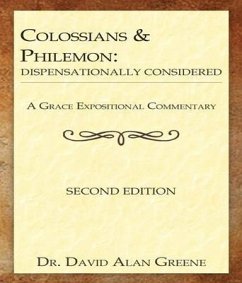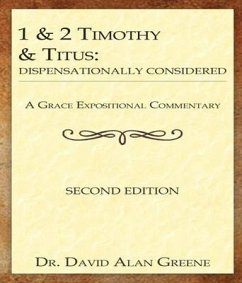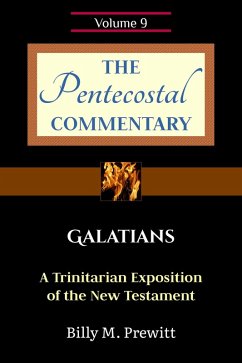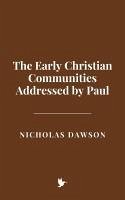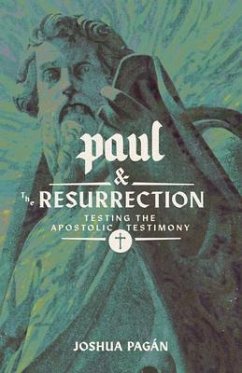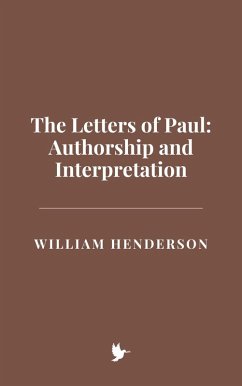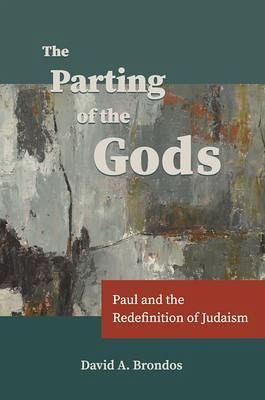
The Parting of the Gods (eBook, ePUB)
Paul and the Redefinition of Judaism

PAYBACK Punkte
9 °P sammeln!
In recent years, a growing number of New Testament scholars have questioned traditional portrayals of the Apostle Paul as a leader of a new religious movement that set faith in Christ in opposition to the Jewish tradition. Instead, they have stressed the need to interpret Paul from within the Judaism of his day, regarding him as a faithful Jew who cherished deeply his Jewish identity and saw observance of the Mosaic law or Torah among Jewish believers in Christ as a good thing. While the present work argues strongly in favor of this latter interpretation of Paul, it also seeks to delve deeper ...
In recent years, a growing number of New Testament scholars have questioned traditional portrayals of the Apostle Paul as a leader of a new religious movement that set faith in Christ in opposition to the Jewish tradition. Instead, they have stressed the need to interpret Paul from within the Judaism of his day, regarding him as a faithful Jew who cherished deeply his Jewish identity and saw observance of the Mosaic law or Torah among Jewish believers in Christ as a good thing. While the present work argues strongly in favor of this latter interpretation of Paul, it also seeks to delve deeper into his thought in order to explore at length the points of continuity and convergence between Paul and the Judaism(s) of his day as well as the beliefs that distinguished him from his fellow Jews who did not share his faith in Christ.
Chief among these beliefs was the conviction that the identity and will of God were now to be defined primarily on the basis of his relation to Jesus his Son, through whom he had intended from the start to accomplish his purposes for Israel and the world. Yet rather than bringing Paul to reject his Jewish heritage, this conviction led him to redefine and resignify around Christ his understanding of Judaism and the way of life prescribed in the Torah, thereby filling them with new meaning, though he also continued to value and uphold them for the same reasons he had previously.
According to Paul, the purpose for which God had sent his Son and delivered him up to death was not that he might atone for sins or make it possible for God to forgive sins, as later Christian thought came to affirm, but rather that through him he might establish a new community in which Jews and non-Jews would be brought to live together as one in fellowship and solidarity. While Paul expected his fellow Jews to continue to live as Jews and members of Israel within this community, which he called the ekklesia, his conviction that those non-Jews who lived faithfully as part of the same community yet did not submit fully to the Mosaic law were equally acceptable and righteous in God's sight led him to oppose all attempts to impose on them the observance of that law. Such attempts implied that the members of the community who observed the law were to be regarded as more righteous or as superior in some way to those who did not and thus threatened to destroy the very fabric of the communities that Paul had worked so hard to establish.
Rather than running contrary to Jewish thought, Paul's teaching that it was a life of faith rather than the observance of works of the law per se that led people to be accepted as righteous by God would have been regarded by most Jews as being fully in accordance with traditional Jewish belief. What they would have found novel was Paul's claim that faith in the God of Israel was now to be equated with faith in Jesus as his Son or "Christ-faith" and that through such a faith non-Jews who did not observe the law could come to be as fully acceptable to God as those Jews who did.
Paul's redefinition of God and Judaism around Jesus as God's Son would have led many of his fellow Jews to conclude that he was proclaiming a God who was distinct from the God in whom the people of Israel had believed from time immemorial, since that God was never thought to have such a Son and much less to have intended to exalt him to his right side as Lord of all after handing him over to death on a cross. From the perspective of Paul and his fellow believers in Christ, however, the God of Israel and the God and Father of Jesus Christ were one and the same.
Chief among these beliefs was the conviction that the identity and will of God were now to be defined primarily on the basis of his relation to Jesus his Son, through whom he had intended from the start to accomplish his purposes for Israel and the world. Yet rather than bringing Paul to reject his Jewish heritage, this conviction led him to redefine and resignify around Christ his understanding of Judaism and the way of life prescribed in the Torah, thereby filling them with new meaning, though he also continued to value and uphold them for the same reasons he had previously.
According to Paul, the purpose for which God had sent his Son and delivered him up to death was not that he might atone for sins or make it possible for God to forgive sins, as later Christian thought came to affirm, but rather that through him he might establish a new community in which Jews and non-Jews would be brought to live together as one in fellowship and solidarity. While Paul expected his fellow Jews to continue to live as Jews and members of Israel within this community, which he called the ekklesia, his conviction that those non-Jews who lived faithfully as part of the same community yet did not submit fully to the Mosaic law were equally acceptable and righteous in God's sight led him to oppose all attempts to impose on them the observance of that law. Such attempts implied that the members of the community who observed the law were to be regarded as more righteous or as superior in some way to those who did not and thus threatened to destroy the very fabric of the communities that Paul had worked so hard to establish.
Rather than running contrary to Jewish thought, Paul's teaching that it was a life of faith rather than the observance of works of the law per se that led people to be accepted as righteous by God would have been regarded by most Jews as being fully in accordance with traditional Jewish belief. What they would have found novel was Paul's claim that faith in the God of Israel was now to be equated with faith in Jesus as his Son or "Christ-faith" and that through such a faith non-Jews who did not observe the law could come to be as fully acceptable to God as those Jews who did.
Paul's redefinition of God and Judaism around Jesus as God's Son would have led many of his fellow Jews to conclude that he was proclaiming a God who was distinct from the God in whom the people of Israel had believed from time immemorial, since that God was never thought to have such a Son and much less to have intended to exalt him to his right side as Lord of all after handing him over to death on a cross. From the perspective of Paul and his fellow believers in Christ, however, the God of Israel and the God and Father of Jesus Christ were one and the same.
Dieser Download kann aus rechtlichen Gründen nur mit Rechnungsadresse in A, D ausgeliefert werden.






